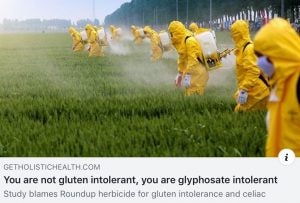Have you ever seen scary headlines like this on the internet before?

Yeah … that’s not how it works. And that image is certainly not what it looks like when North American farmers spray crops.
Article headlines like this have been going somewhat viral for years, but have also been debunked for years. I always say when desiring real facts, make sure you go straight to the source. So who better to learn about wheat farming from wheat farmers themselves?
Meet farmer Joe:

Joe farms about 2,000 acres in North Carolina, one of these crops being wheat. I toured his farm, along with several other wheat farms and spoke to many wheat growers and agronomists, and they all had one thing in common:
They have never sprayed the herbicide glyphosate on wheat and don’t know any wheat grower who’s ever done that.
Now that’s not to say it can’t be done, but spraying glyphosate on wheat is highly uncommon in the U.S. Wheat is not glyphosate-tolerant, so if you spray it, it kills it. In colder climates where the growing season is much shorter, it may be done a week or two before harvest to get that last flush of weeds removed to make harvesting the crop easier. (Canadian farmer and blogger Nurse Loves Farmer has one of the best explanations of glyphosate and wheat that you can find anywhere.)
The National Wheat Foundation even talks about this on its website, saying: “Pre-harvest applications [of glyphosate] are only made after the wheat plant has shut down, when wheat kernel development is complete and the crop has matured. This is prior to harvest and used to dry green weeds and allow the crop to even its maturity. This is an uncommon treatment used in less than 3 percent of all wheat acres; however, it can be used to enable a harvest that would otherwise not be possible, if weather conditions prevent the wheat crop from drying sufficiently to be harvested.”
It’s important to understand that the dose makes the poison of any chemical and that herbicides affect enzymes found in plants, not mammals or insects. And by no means are the crops “drenched,” as some activists like to phrase it. Wheat would be sprayed with glyphosate at a rate of around 12 ounces per acre, equivalent to about a soda can’s worth on an area of land the size of a football field! (Side note: Also contrary to popular myths, oats are NEVER sprayed with glyphosate in the U.S.)
So, how do wheat farmers manage weeds then, especially as more and more wheat growers have adopted no-till or minimal-till conservation measures?
Well, wheat is still an herbicide-tolerant crop, which is particularly interesting since all wheat is non-GMO. While some genetically engineered crops are known to be herbicide tolerant, plenty of non-GMO crops also have the same breeding characteristics and traits. (Any statements to the contrary are usually because of the deceptive marketing from food companies.)
So, herbicide. The minimal amount used will shock you! Joe uses a whopping half ounce of Harmony herbicide per acre. A half ounce. That’s it!! And he sprays only once a year! He may not even spray at all if the weather is rainy … herbicide use is only used by farmers if the weather conditions are right, and all farmers are required to carry certifications, licenses, and go through training to apply any synthetic farm chemical.
It’s funny: There are plenty of farmers out there (myself included) who are not certified organic but never use any pesticides. We are oat and hay farmers, and haven’t had to spray anything on these crops in years. Joe may not have to spray either. But we will, if we need to, based on weeds or insect pressure. Any farmer wants to avoid spraying chemicals if we can. They’re expensive and time consuming to apply, but sometimes it’s necessary to use them to protect our crops, or else up to 40 percent of the world’s food production would be lost.
Anyway, the moral of the story is … don’t believe everything you read on the internet and always go to the source. From a scientific and toxicity perspective, it really is humanly impossible for herbicides to harm our health; you’d need to eat millions of loaves of bread in a single sitting per day to have any effect. (Challenge accepted?) The safety of glyphosate-based products is backed by one of the most extensive worldwide human health, safety, and environmental databases ever compiled for a crop protection product.
Eat a healthy diet of whole grains, lean proteins, whole fruits, and veggies. Avoiding processed foods is common sense, or consume “junk food” in moderation. But avoiding certain foods based on internet myths is the real “junk.”
Michelle Miller, the Farm Babe, is an Iowa-based farmer, public speaker, and writer, who lives and works with her boyfriend on their farm, which consists of row crops, beef cattle, and sheep. She believes education is key in bridging the gap between farmers and consumers.



